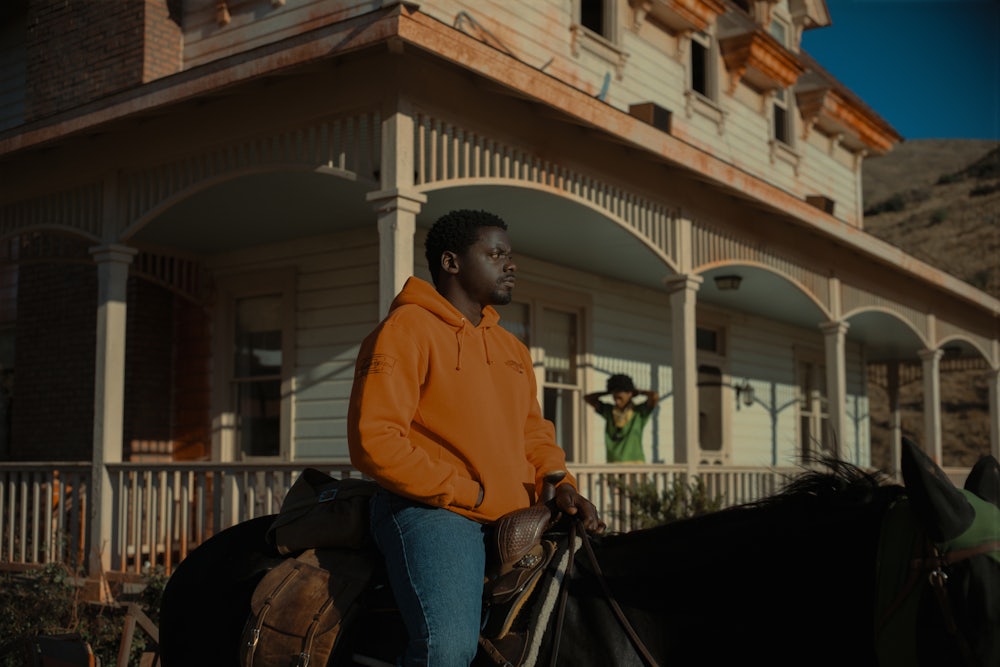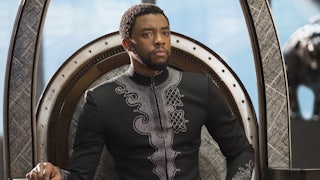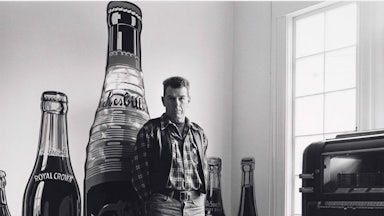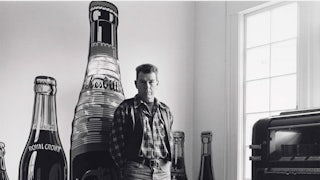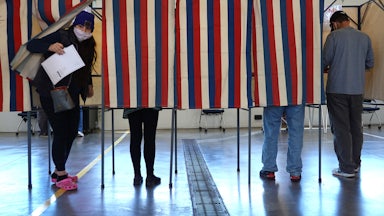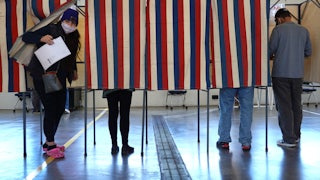At its heart, the expression “Nope!” is an exclamation born out of a desire to survive. Writer-director Jordan Peele titles his new film Nope and puts that phrase in the mouths of several of his characters in order to play upon a widely held piece of Black American lore: that we would never do all of the oblivious and reckless things that white people do in horror films. This declaration indicts a clueless white innocence that is irresponsible and thus dangerous, but it also reveals something tragic about its utterer. “Nope!” depends on the idea that Black people are so well acquainted with quotidian violence that we immediately recognize the danger inherent in choosing to spend an evening at a graveyard or casually opening a newly discovered door in an abandoned Victorian house just to see where it might lead. “Nope!” reminds us that Black people can’t take these risks because—as Breonna Taylor and Ahmaud Arbery demonstrate—we are always in peril.
Peele explored the psychic cost that comes with living with the dangers inherent to Black life in Get Out, his breakthrough 2017 film. In that story, the protagonist’s loyal friend, Rod, persistently—and correctly—warns Chris about the risks he is taking by spending a weekend with his white girlfriend’s parents at their rural estate. Nope expands on this notion by locating its danger not just outside of a predatory white supremacy but also literally outside. The dutiful Otis Haywood Jr. (Daniel Kayluuya)—to whom everyone in the film refers as OJ, a very heavy-handed joke—has inherited the family business from his recently deceased father: Haywood’s Hollywood Horses, a company that provides horses and handlers for the film industry. His sister Emerald Haywood (Keke Palmer) is the prodigal daughter, reluctantly returning to the family business after years of striving to make the difficult move from growing up adjacent to the film industry to becoming a performer in her own right. There seems to be precedent for this: According to Haywood family lore, OJ and Emerald’s great-great-(great?)-grandfather was the nameless jockey depicted in Eadweard Muybridge’s 1887 collotype “Animal Locomotion, Plate 626,” one of the earliest examples of what would eventually become motion pictures. In that sense, OJ and Emerald allegedly descend from one of the original movie stars, the first Black man ever depicted in the medium.
The film moves along parallel paths, with one narrative focused on the Haywood siblings and their struggling animal husbandry business and the other on Ricky “Jupe” Park (Steven Yeun), a former child actor whose life is marked by a tragic and traumatic event from his past. Jupe and his family now run a theme park and petting zoo called Jupiter’s Claim that sits in the Santa Clarita Valley, adjacent to the Haywood horse farm. The name Jupiter’s Claim plays on two of Hollywood’s most enduring notions of the frontier: the infinite and sterile grandeur of outer space and the pristine vastness of the American West. The tawdriness of Jupiter’s Claim makes it clear that Peele rejects the premise that lies at the heart of the idea of the frontier: an unspoiled landscape that offers rugged and determined white men the opportunity to make their fortune and remake their identity by imposing their will on the environment. OJ Haywood’s physicality and stoic yet sensitive persona might recall Clint Eastwood in Sergio Leone’s The Good, the Bad and the Ugly (1967), but OJ’s generational connection to both the land and the film industry makes him unwilling to indulge in romantic and self-serving notions of transcendence. OJ just wants to take care of the horses he raised with his father, but he’s reluctant to make this easier by reminding the production companies that hire him and his horses that he is the inheritor of a venerable Black business.
Emerald displays none of OJ’s hesitancy when she arrives (late!) to the set of the film that contracted Haywood’s Hollywood Horses. She trumpets her family lineage and its connection to Muybridge as she tries to impress upon a clearly indifferent crew that she’s capable of doing more than just helping pampered actors perform with animals. The crew mostly ignores her. Although the film places the two families in opposition to each other, Emerald Haywood and Jupe Park seem cut from the same cloth. Both are ambitious and seek to attain—or, in Jupe’s case, regain—the celebrity that might move them from the periphery to the center.
Of course this is a Jordan Peele film, which means that we should expect jump scares alongside his nuanced ideas about race and representation, and Peele mostly delivers. The opening scene—which details why Jupe’s burgeoning acting career suddenly ended—is chilling, and when the film returns to this scene more than an hour into its run time, Peele manages to scare us again, even though the audience already has some idea of what’s coming. The additional information Peele presents about Jupe in the interim only serves to make the denouement of this scene more shocking.
There is also a mystery lurking in the Santa Clarita Valley, and while OJ perceives this as a threat to his horses, both Jupe and Emerald see it as an opportunity. To this end, Emerald convinces OJ to hire Angel Torres (Brandon Perea), an audio/video expert from the local big box store, to set up the equipment that they hope will allow them to capture video evidence of the mysterious force. Angel soon finds himself invested in helping the Haywood siblings solve the mystery at the heart of the film.
It’s here that the movie’s narrative begins to lose focus, and some of the same issues that undermined the last 20 minutes of Peele’s second film, Us (2019), return. The taciturn OJ acquiesces to Emerald’s desire to parlay the footage they hope to capture into a reality TV show, despite scolding her earlier in the film for having her head in the clouds and being overly familiar on set. OJ, Emerald, and Angel keep trying to capture footage, even as the nature of the threat is revealed to be more deadly than any of them initially suspected. Each of them has reasons connected to lineage and legacy and desire to press on, but at this point, a reasonable Black—or in Angel’s case, Latino—person might conclude after performing a cost-benefit analysis that now was the time to exit the scene.
While the film’s third act reveals Peele’s shortcomings as a writer, Nope firmly establishes his quality as a director. Kaluuya demonstrated a bombastic charisma in his Oscar-winning role in Judas and the Black Messiah (2021) and a simmering menace in the underrated Widows (2018), but under Peele’s direction he communicates his feelings in Nope mostly through mournful glances and hunched shoulders. Palmer here is a coltish, jangly live wire who expertly fills the space provided to her by Kaluuya with both a restless frustration about how her life has turned out and sincere affection for her big brother. Yeun’s role is more subtle still, as it requires him to maintain his boyish appeal even as he shifts from an embittered afterthought forgotten by the Hollywood machine to a jaded realist who has made his peace with the fact that he’s been reduced to a meme parodied on Saturday Night Live, to a doting stage father hopeful that he can guide his sons into a more fulfilling career in entertainment than the one he enjoyed.
Jordan Peele is a gifted filmmaker, capable of collaborating with exceptional talent behind the scenes, such as cinematographer Hoyte Van Hoytema (Interstellar, Dunkirk, Tenet) and costumer Alex Bovaird (White Lotus, American Honey) to produce a visually stunning film with a distinct cinematic and sartorial vocabulary. He has plenty to say about how Hollywood traps Black and Korean and Latino actors in reductive roles that limit the depth of their performance. I just wish he would spend a little more time fashioning more satisfying conclusions to his films. While it’s unfair to expect a filmmaker to construct another ending as emotionally satisfying as that of Get Out, the world Peele so carefully builds in Nope deserves a better resolution.
